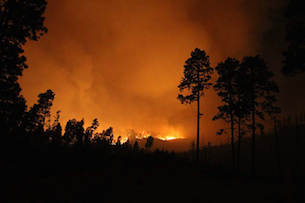Wildfires across the western United States have been getting bigger and more frequent over the last 30 years — a trend that could continue as climate change causes temperatures to rise and drought to become more severe in the coming decades, according to new research.
The number of wildfires over 1,000 acres in size in the region stretching from Nebraska to California increased by a rate of seven fires a year from 1984 to 2011, according to a new study accepted for publication in Geophysical Research Letters, a journal published by the American Geophysical Union.

The total area these fires burned increased at a rate of nearly 90,000 acres a year — an area the size of Las Vegas, according to the study. Individually, the largest wildfires grew at a rate of 350 acres a year, the new research says.
“We looked at the probability that increases of this magnitude could be random, and in each case it was less than one percent,” said Philip Dennison, an associate professor of geography at the University of Utah in Salt Lake City and lead author of the paper.
The study’s authors used satellite data to measure areas burned by large fires since 1984, and then looked at climate variables, like seasonal temperature and rainfall, during the same time.
The researchers found that most areas that saw increases in fire activity also experienced increases in drought severity during the same time period. They also saw an increase in both fire activity and drought over a range of different ecosystems across the region.
“Twenty eight years is a pretty short period of record, and yet we are seeing statistically significant trends in different wildfire variables–it is striking,” said Max Moritz, a co-author of the study and a fire specialist at the University of California, Berkeley, Cooperative Extension.
These trends suggest that large-scale climate changes, rather than local factors, could be driving increases in fire activity, the scientists report. The study stops short of linking the rise in number and size of fires directly to human-caused climate change. However, it says the observed changes in fire activity are in line with long-term, global fire patterns that climate models have projected will occur as temperatures increase and droughts become more severe in the coming decades due to global warming.
“Most of these trends show strong correlations with drought-related conditions which, to a large degree, agree with what we expect from climate change projections,” said Moritz.
Read the full story from the American Geophysical Union.
